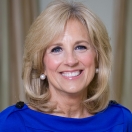
Ed note: Dr. Jill Biden wrote this op-ed for USA Today.
Danny Anderson is an American hero. He is also a role model — in more ways than one.
Danny spent six years in the Army. He loved serving his country, and when he completed his time in the military, he was eager to find other ways to serve. So Danny decided to use his military benefits to earn his degree and enrolled in Hopkinsville Community College's nursing program. Through a partnership between Gateway Medical Center and Hopkinsville Community College in Kentucky, Danny became a registered nurse and is now employed in Gateway's emergency care department.
I met Danny last month when I traveled with Labor Secretary Hilda Solis on a five-state "Community College to Career" bus tour to highlight the types of successful community college industry partnerships that are working and can serve as models for the nation.
The impact Danny's community college education had on his life is clear — and is one I see replicated on community college campuses across the country, as well as in my own 18 years as a community college professor.
Hope and guidance
"Community colleges give you hope and help guide you toward a better future," Danny said. He couldn't be more right.
Workers who attend community college significantly increase their lifetime earning potential. The average community college graduate earns $8,320 more per year than someone with just a high school diploma. Not only is the math pretty simple, the effect on a community is truly inspiring. The sense of hope expressed by Danny is one I have seen in my classroom for years and is one we saw on every stop of our bus tour.
Though the value of higher education has been a recent topic of debate, its tremendous and unique value is indisputable. The types of partnerships we saw are exactly what President Obama hopes to grow with his "Community College to Career Fund," an $8 billion budget proposal to connect community colleges with businesses to train 2 million workers in high-growth industries with skills that will lead directly to jobs. Community colleges are key to meeting the president's goal of having the best-educated, most competitive work force in the world by 2020.
Public-private collaboration
At our first stop in Ohio, we heard from formerly unemployed workers who had completed training through industry partnerships with Columbus State Community College and are now back to work in the high-growth fields of information technology and logistics. On our way to Dayton, Ohio, we heard about how a bioscience industry partnership with six community colleges is preparing workers for high-demand jobs in the growing bioscience industry.
Another Ohio partnership is helping low-income and displaced workers move into health careers. In Tennessee, veterans are being trained to become engineers — and through a unique partnership receive a guaranteed internship that leads to a job.
In Virginia, we heard from midcareer employees who are trained in new technologies to stay current and grow in their careers through a partnership with Wytheville Community College. We wrapped up our bus tour in North Carolina, where we saw how Davidson County Community College has grown partnerships with area companies to train workers with specific skills — whether that is electronics engineering or computer manufacturing.
It's clear these partnerships are working, and that's why we want businesses and community colleges across the country to replicate the kinds of successes we heard about on our tour. Not only are community colleges meeting the specific needs of employers in their region, they are also helping get workers into good-paying jobs that allow them to provide for their families and give them a renewed sense of hope and confidence.
Jill Biden is the second lady of the United States and has been an educator for more than 30 years.


